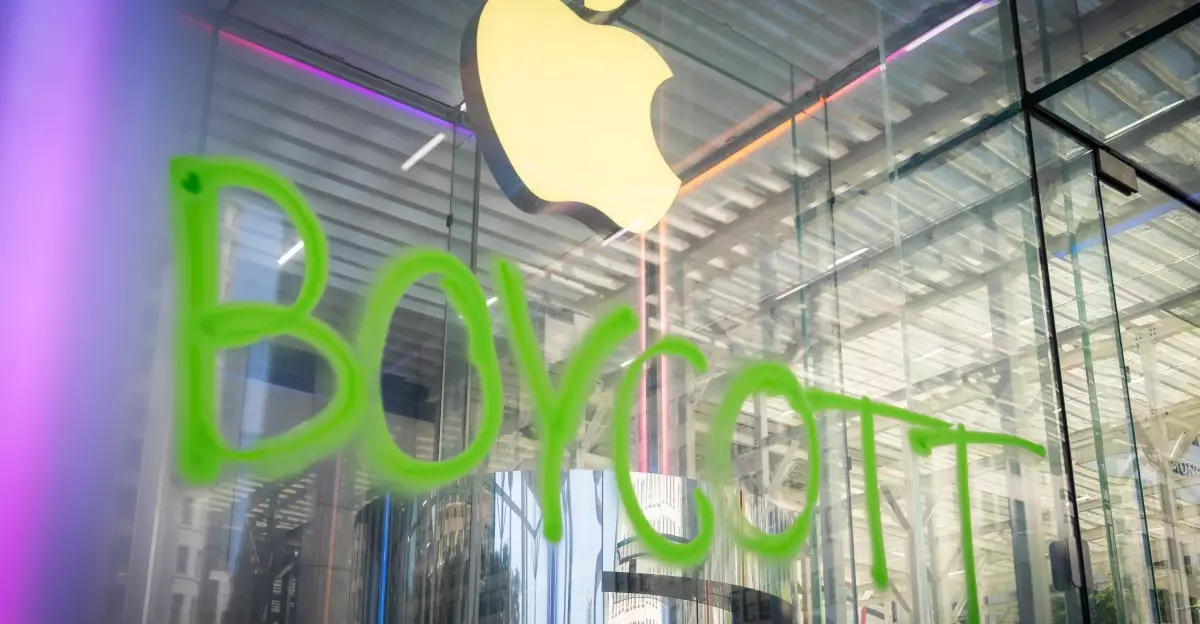In a world clamoring for meaningful change, grassroots movements like Extinction Rebellion refuse to remain silent in the face of corporate and political betrayal. Their latest act at Apple’s flagship store in New York City exemplifies a potent blend of civil disobedience and raw truth-telling. By spray-painting provocative messages such as “Tim + Trump = Toxic” and “Boycott,” activists directly challenge the narrative that tech giants are environmental allies. This act is not merely vandalism; it is a call to awaken consumers and stakeholders to the dissonance between corporate rhetoric and actual practices. These protests highlight a critical issue: organizations that market themselves as eco-friendly often prioritize profit over planet, hiding behind greenwashing while supporting policies detrimental to climate health.
Exposing the Paradox of Corporate Climate Commitments
Apple and other tech giants loudly tout commitments to sustainability, claiming to champion the fight against climate change. Yet, behind the scenes, their political alliances and financial ties reveal a different story. The protest zeroes in on the stark contradiction of these companies’ actions—particularly their support for policymakers aligned with fossil fuels and climate rollback initiatives. Their high-profile executives, despite publicly endorsing the Paris Agreement, appear to overlook the urgency of the crisis when it conflicts with their business interests. Extinction Rebellion’s targeted demonstration is a deliberate challenge to this fake virtue, exposing how corporate statements often mask complicity in environmental degradation.
The Political Symbiosis: Big Tech’s Troubling Alignment with Power
The protest underscores a disturbing link: top CEO figures from Apple, Google, and Meta appeared at Donald Trump’s inauguration, signaling an uncomfortable alliance with a leader who openly undermines climate regulations. Such associations reveal priorities rooted in political clout and financial gain, not environmental activism. For years, these companies claimed to be “supporters of the Paris Agreement,” yet their actions—investments in fossil fuels, energy-intensive AI development, and lobbying efforts—undermine global climate efforts. This betrayal fuels skepticism about the sincerity of corporate claims, turning their glossy sustainability reports into little more than marketing tools.
Climate Impact of Technology: A Hidden Cost
While protests spotlight political and corporate hypocrisy, they also draw attention to the often overlooked environmental cost of the very technology these companies promote. Data centers, AI development, and increased energy demands are rapidly escalating carbon footprints. Google’s rising emissions and Microsoft’s AI investments exemplify a paradox: technological innovation touted as a solution to climate change is in many ways exacerbating it. As these firms chase the promise of AI and digital growth, they exacerbate energy consumption, creating a cycle of environmental harm masked by innovation.
The Moral Failings of Tech Titans: Tim Cook and the Climate Crisis
Perhaps most infuriating is the optics surrounding Apple’s leadership. Tim Cook’s public declaration that combating climate change is an “urgent priority” rings hollow when contrasted with his donations and political support for figures like Trump, who has actively worked to dismantle environmental protections. Such duplicity is emblematic of a broader pattern where corporate virtue signals are intentionally disconnected from actions. This disconnect erodes public trust and deepens the moral bankruptcy of a system that profits from the exploitation of natural resources under the guise of sustainability.
The Necessity of Confrontation and Accountability
The act of spray-painting slogans on a corporate storefront might seem provocative or even reckless to some, but it underscores an undeniable truth: surface-level activism is insufficient to tackle the depth of ecological crisis we face. Real change demands relentless scrutiny of the motivations behind corporate claims and unwavering pressure on political allies. Citizens and activists alike must demand transparency and accountability from companies that profit from environmental destruction. Their actions demand a reckoning—an acknowledgment that true climate leadership requires consistency, integrity, and an unwavering commitment to the planet’s future, not mere marketing ploys.
In the end, the protests serve as a stark reminder: silence and complacency are accomplices to environmental ruin. The fight against climate betrayal is a collective moral imperative, and acts of defiance—whether through protests, activism, or societal pressure—are vital in unveiling the uncomfortable truths that powerful institutions prefer to hide.


Leave a Reply